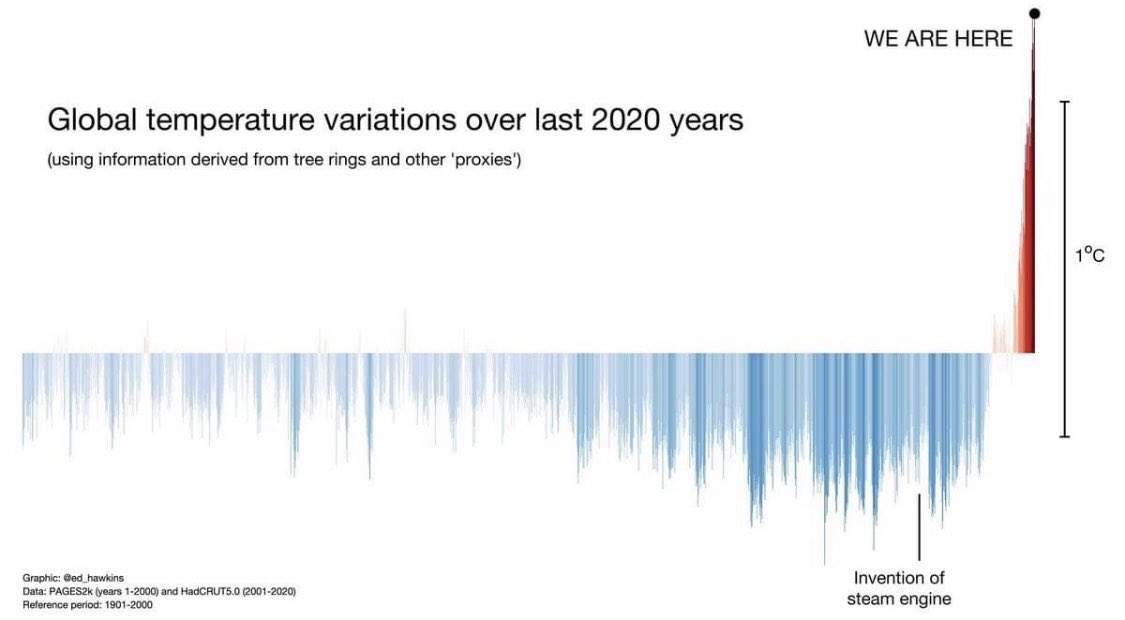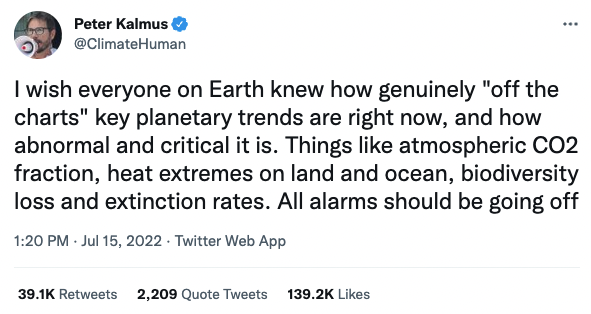Posts
Last edited: Aug 1, 2022, 1:06pm EDT
Anthropocene Calamity, part 1: Holy shit, things are super bad

Things are really, really bad. They’ve been bad for a while, but they are accelerating rapidly.
- The World Lost Two-Thirds Of Its Wildlife In 50 Years. We Are to Blame.
- 13,800 scientists warn of “untold suffering,” passing tipping points, and catastrophic threat.
- The most recent climate report is an “atlas of human suffering.”
- IPCC report: ‘now or never’ if world is to stave off climate disaster
Don’t skim over those links. Go read them. This is important.
Whatever you think about the situation, it’s probably far, far worse than you are thinking. These links are unanimous scientific consensus–the conservative view! Don’t get me wrong, this blog post isn’t trying to discourage you; this blog post is just the first of a series of concrete action steps I think we should all take. But I want to make sure you understand the scale and magnitude of the problem first.
Modern humans have been around on the planet for only 0.005% of the history of life on Earth. If we scale the history of all life on Earth to a year, modern humans have existed for 27 minutes. All of recorded history is only in the last 41 seconds. The existence of capitalism is only 2.4 seconds, and humans since the industrial revolution are just 1.8 seconds.
And yet we are destroying the planet at a terrifying rate the planet has never experienced before. We are destroying the only habitable place we know. On our current trajectory, the “Anthropocene” will be an event, not an era. In other words, we’ll be the meteor, not the dinosaurs.
Scientists are running around frantically trying to pull every fire alarm lever they can, only to find no fire alarms. If there was a fire alarm for humans on Earth, it would be blaring. Seriously, that BioScience peer-reviewed article at the beginning promises untold suffering if we don’t make “transformative change.” Peer-reviewed! Signed by 13,800 experts! This is not some raving of some doomsday cult; this is the position of the entire scientific community.
We need a drastic change to the economy and society, to the level that will probably kill people, though far less than if we do nothing.
Fire alarms give people permission to act differently. Otherwise clear evidence of fire doesn’t motivate groups of people to change their behavior drastically. But, no fire alarm is coming, and we must act as if it is going off anyway.
Mars isn’t going to save us, either, by the way. Mars has no magnetic field, which means if we were to make it to Mars, inhabitants would either be irradiated by the star we orbit or forced to live in caves. It will always be easier to live on Earth than Mars, even if it is in vats in caves, thanks to Earth’s magnetic field. An additional benefit of Earth - we’re already here! No, Mars doesn’t help. We’re stuck with Earth.
The most commonly modeled “worst case scenario” climate model is the “RCP8.5” global warming scenario and it assumes that we stay, get this, “business as usual.” Unfortunately, as we continue to discover more previously unknown climate feedback loops (which we keep doing), existing RCP8.5 models are going to be far too optimistic. We keep learning more, and the situation keeps seeming more dire. It is becoming more and more likely that the global runaway tipping point is the already-passed 1° C. Arctic temperatures are already 50 degrees above normal. Even just this week during a 117° F heatwave in Portugal, there are news articles with subheadings like: “Even the most pessimistic models didn’t forecast this,” says an Israeli environmental expert, as extreme temperatures and wildfires tear through Europe and Asia.
Sudden death is probably not the worst outcome. Death due to an uninhabitable planet will not happen all at once. First, we’ll have growing fights over resources. We’ll fight over habitable land, which will first look like large refugee caravans and open/closed border disputes. We’ll fight over supply chains and who makes what. Eventually, our current period of abundance and prosperity could end. Remember Blockbuster? Remember the nostalgia you have for Blockbuster VHS rentals? Unless things change, huge proportions of the planet and possibly even you will be feeling that way about grocery stores, food, and maybe even water. And if still nothing changes, the last people to starve will be the first people to suffocate. It won’t take much of a temperature shift to kill all the plankton (which generate most of our oxygen)!
People won’t just die from heat in hot areas, they will die from poorly stocked hospitals and kitchens, they will die from unprepared social systems they once relied on but no longer can. If you think this is in the distant future, climate change already helped spark the Syrian Civil War. The Syrian refugees that stressed Europe’s existing social systems were arguably some of the first climate refugees. It’s already here.
It’s worth pointing out how critical the stability of the climate that humans previously adapted to is for food production. Because plants also need consistency, one errant heatwave can destroy an entire region’s annual food output. Severe weather is becoming more common and weather is becoming more unpredictable everywhere. And because of this, interruptions to our food supply thanks to climate change are definitely already here: mustard, wheat, coffee, Sriracha, soybeans, chickpeas, wine, apples, arugula, maple syrup, kimchi, honey, wasabi, pork, beer, not to mention lumber, and semiconductors (thanks to Madison Condon for this list). If you thought this was all just lingering from pandemic supply chain issues, think again!
Surely, surely, we’ll be able to adapt, right? Well, who’s we? The planet has nearly 8 billion people. Without extreme changes, 3 billion of those people are in areas projected to be uninhabitable by humans! Seriously think about what that means. Where are those 3 billion people going to go? Where are your semiconductors made? Where do your olives come from? What’s coming will affect everyone and wreck everything.
You won’t hear about how dreadfully, awfully bad things are because psychologists keep telling climate scientists not to be so negative. For instance:
Instead, be hopeful. There is a lot of fear, despair, and disillusionment in the climate change conversation, but hopelessness has never moved anyone to action. Hope on the other hand, is a powerful emotion, one that has the potential to transform fear into something productive, and one that can give us back agency and a plan of action to deal with this. Hope is one of the most powerful tools we have to move people to take action.
This is why preventing catastrophe is always “nearly” out of reach. It will remain advertised as such, despite whatever the facts are. As a rhetorical technique it’s important to consider the psychology of what you’re trying to convey, but frankly this advice is seriously distorting the truth of the situation. It’s especially discordant advice when climate science is sending climate scientists to therapy. Climate scientists are not doing well. Frankly, the therapists are having a hard time themselves. I am hopeful that as a reader of mine you can handle the truth here. Things are extremely dire and we must act now to prevent worse calamity.
There are some pieces of good news, certainly! Solar and wind energy are doing much better than we expected! There is indeed a window where we might be able to make enough of a difference to avoid the absolute worst outcomes. But this is not a situation where the goal posts keep moving. There are some remaining goals we still can hit, but we have also missed some goals for sure. If you keep hearing “we still have time,” what you aren’t hearing is that the things remaining we still have time for are becoming more bleak and more dire.
A friend of mine pointed out that, collectively, the “optimism only!” policies have caused us to communicate in a way that replicates the mistakes of the Challenger Disaster: good news travels well, bad news is softened, muted, or discouraged altogether. “Good news sandwiches” led NASA management to go ahead with the launch even though Thiokol engineers knew the O-rings were a major risk! And this is precisely what we’re doing with climate change if we are not clear and direct about what is at stake and what bad news is already locked in. You can’t be hopeful and optimistic about solving something you don’t perceive as a problem in the first place. Understanding the magnitude of the problem must come first, so we can’t dull it down.
We have enough data, to the point that climate scientists are considering just stopping research. We know that humans have caused a global extinction-level event to many species already, and we’re next, though not without massive suffering first. If you’re religious, aren’t we supposed to be good stewards of nature? Mobilizing to rise to this existential threat ought to be an awe-inspiring wartime effort from every country, across the board. How is it not? How can we be so small minded? How can we not see how fleeting our moment is in the cosmos?
It is urgent that you and I act now. Things won’t return to how they used to be, but we can prevent them from becoming even worse.
Only 1/3rd of wildlife remains. “Untold suffering.” “Catastrophic threat.” “Climate emergency.” Peer-reviewed! 13,800 scientists. This isn’t happening in 50 years; this is happening now. The timescale we have to act is not decades; it is months, weeks, days. Are we acting on this? What the fuck are we doing?
This is the first part of an 11 part series about what, if anything, I think you and I can do. The summary for this overall blog series which I’ll be posting over the coming days is:
- We need to persuade anyone and everyone that hitting the brakes on the oncoming train is the most urgent priority across the board. I need you, human reading this, to commit that this will be your top priority if it isn’t already, starting today. You could share my post!
- We also need to be putting on seat belts for ourselves and others, especially the most vulnerable. Guess what, this also needs to be your top priority! Two top priorities.
On to part 2: Are you yelling until your voice is hoarse?
- Part 1: Holy shit, things are super bad
- Part 2: Are you yelling until your voice is hoarse?
- Part 3: Every part of the pie must shrink
- Part 4: Your pie chart looks different than others
- Part 5: Sell Bitcoin, Save Lives
- Part 6: Are you spending your attention and money well?
- Part 7: It’s seat belt time
- Part 8: Climate models 101
- Part 9: Project Lifeboat
- Part 10: A personal update
- Part 11: Humanity can survive!
Thanks to Christy Olds and Jeff Wendling for advice and feedback on early drafts.
